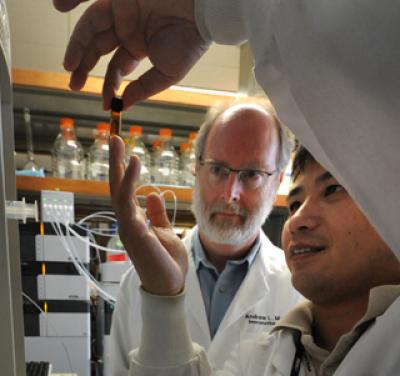A research team from the Georgia Health Sciences University has demonstrated that DNA nanoparticles, a DNA-wrapped submicroscopic delivery system for supplying drugs and genes straightaway into cells for disease treatment, show therapeutic value.

Drs. Andrew L. Mellor and Lei Huang at Georgia Health Sciences University have shown a system called DNA
nanoparticles, used to deliver genes or drugs directly into cells to treat a variety of diseases, may help arthritis without delivering anything. (Credit: Phil Jones, GHSU Photographer)
In the study, the research team discovered that the injection of DNA nanoparticles without any payload had improved expression of indoleomine 2,3 dioxygenase (IDO), an enzyme that calms the response of the immune system. The improved IDO expression drastically reduced the limb joint swelling and inflammation, a hallmark symptom of autoimmune disease, rheumatoid arthritis.
The study results show that this DNA nanoparticle technique itself has therapeutic value to counter autoimmune diseases such as lupus, type 1 diabetes and arthritis, and protect transplanted organs. The researchers discovered the IDO expression improvement capability of these DNA nanoparticles serendipitously during their study on the autoimmune treatment potential of IDO by pay loading human IDO gene. Research is going on to understand the role of DNA nanoparticles in the improvement of IDO expression.
Preliminary results showed that the arrival of these DNA nanoparticle triggers immune cells to produce more IDO. Follow-up studies include documentation of all cells that produce more IDO as a response. The researchers used a non-biodegradable polymer in this study and they need a biodegradable one to get biodegraded safely in the body. To find the optimal polymer, they have teamed up with biopolymer experts at and the Georgia Institute of Technology, the University of California, Berkeley, and Massachusetts Institute of Technology. The researchers had also experimentally proved that the IDO expression was the cause for the enhancements.
Disclaimer: The views expressed here are those of the author expressed in their private capacity and do not necessarily represent the views of AZoM.com Limited T/A AZoNetwork the owner and operator of this website. This disclaimer forms part of the Terms and conditions of use of this website.